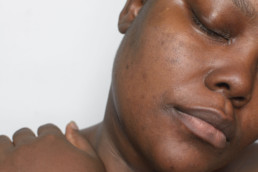
What is Post Inflammatory Hyperpigmentation (PIH)?
Post-inflammatory hyperpigmentation (PIH) is the darkening of the skin in an area of prior injury or skin disorder. The discolouration is due to the production of excess melanin (pigment) as part of the skin’s natural response to inflammation. The darkening may also be due to an iron pigment left behind when old red blood cells die. Acne is a common cause as well as any type of skin injury, such as those caused by aesthetics treatments, or skin disorders, such as eczema.
PIH usually looks like a flat area of discolouration on the skin. It can appear white, pink, red, purple, brown, or black, depending on skin tone and the depth of the discolouration. Post Inflammatory Hyperpigmentation can develop in all skin types. However, it tends to be more severe and longer-lasting for people with medium to dark complexions. People of colour have more pigment (melanin) so there is more of a chance of post inflammatory hyperpigmentation with certain skin problems. PIH is one of the most common reasons why people with darker skin seek the advice of a dermatologist.
An injury, rash or blemish causes the skin to become inflamed. This inflammation triggers melanocytes – the melanin-producing cells – to release excessive melanosomes (pigment granules). The excessive pigment granules darken and discolour the formerly wounded area, remaining there long after the initial wound has recovered.
The more inflammation there is, the more obvious the area of discolouration will be both in terms of size and colour. In cases where PIH is caused by acne, picking pimples can worsen the skin condition, leading to increased hyperpigmentation.
What Causes Post Inflammatory Hyperpigmentation?
Sun
The sun can aggravate symptoms of PIH, darkening the affected patches and prolonging the time it can take for them to fade. The sun is closely associated with other forms of hyperpigmentation such as age/sun spots and melasma.
Wounds or Irritation
PIH develops when a wound or irritation (a scrape, rash, or pimple) causes the skin to become inflamed. As the skin heals, it produces too much melanin which darkens the skin.
Sunburn
Sun exposure without sunscreen or sun protection can make PIH worse by stimulating cells in the skin to produce additional pigment, which is why it is important to wear sunscreen or avoid sun exposure when you have a skin injury.
How Do You Get Rid Of Post Inflammatory Hyperpigmentation?
Post-inflammatory hyperpigmentation does not cause scarring and even with no treatment, it will improve over time. Recovery rates vary from person to person: the timing depends on the difference in skin tone between the natural skin tone and the darkened patches – the more significant the difference, the longer it will take for the uneven skin tone to rebalance.
Do Chemical Peels Cause Post Inflammatory Hyperpigmentation?
Post inflammatory hyperpigmentation can both be cured by and paradoxically caused by a chemical peel. Due to The Perfect Peel’s blend of multiple acids combined in low percentages, the risk of developing PIH is decreased, compared to other chemical peels.
Hyperpigmentation usually occurs on areas of skin where the deepest parts of the peel are found. PIH will only affect the areas of skin that have been treated with a chemical peel (although this is very rare).
Post Inflammatory Hyperpigmentation Treatments
Your skin professional will be able to advise on effective topical agents for reducing post-inflammatory hyperpigmentation.
Hydroquinone
Hydroquinone is a widely used treatment for PIH and available on prescription in the UK. Hydroquinone works by blocking the enzyme responsible for melanin production, thereby lightening the skin. These creams often contain additional lightening ingredients, which can give you better results than using hydroquinone alone. Ingredients combined with hydroquinone include:
- Kojic acid (a chemical made from fungi)
- Glycolic acid
- Tretinoin and other retinoids
- Vitamin C
ASK YOUR PRACTITIONER ABOUT THE PERFECT B CREAM.
Retinoid Creams
- Retin-A (tretinoin)
- Retin-A Micro
- Tazorac (tazarotene)
- Differin (adapalene)
ASK YOUR PRACTITIONER ABOUT THE PERFECT A CREAM
Azelaic Acid
Azelaic acid is another ingredient used to treat PIH. It works by decreasing inflammation and speeding up cell turnover rates. Azelaic acid is sometimes used along with glycolic acid or tretinoin.
Most recommended posts
- Celebrating Father’s Day and Enhancing Male Skin Health
- Trichloroacetic Acid FAQs
- Retinol FAQs
- Glycolic Acid FAQs
- Glutathione FAQs
- Aesthetics Awards 2022 Finalists
- Treating Keratosis Pilaris
- Why Choose A Blended Chemical Peel?
- Chemical Peels for Treating Hyperpigmentation: The Professional’s View
- Lactic Acid FAQs
- Do chemical peels slow down ageing?
- Winter skin woes: why NOW is the perfect time for The Perfect Peel
- ABC News
- Peel today, glow tomorrow, Project Beauty
- Bella Medical launches The Perfect Derma Peel™ in Beverly Hills
